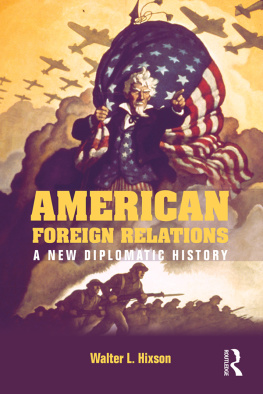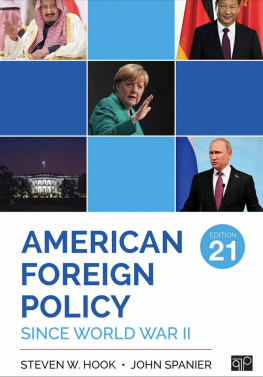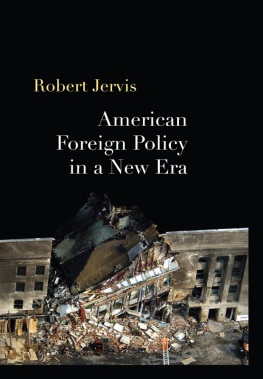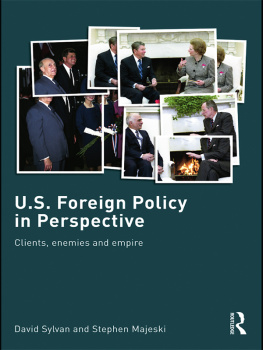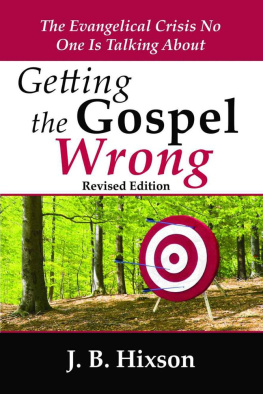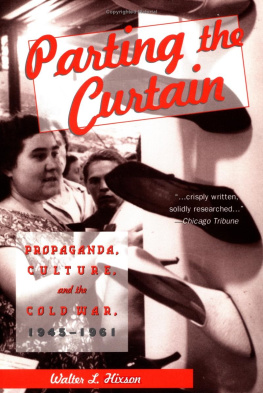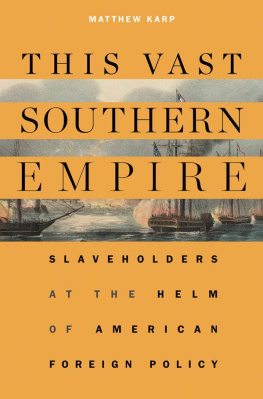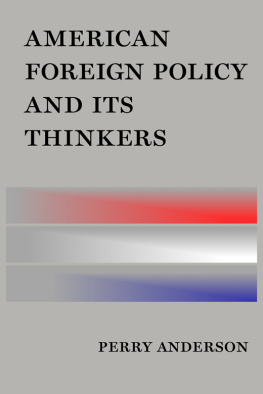American Foreign Relations
American Foreign Relations: A New Diplomatic History is a compelling narrative history of American foreign policy from the early settlement of North America to the present. In addition to economic and strategic motives, Walter L. Hixson integrates key cultural factorsincluding race, gender, and religioninto the story of American foreign policy. He demonstrates how these factors played a vital role in shaping the actions of the United States in world affairs. Beginning with the history of warfare and diplomacy between indigenous peoples and Europeans before the establishment of the United States, this book shows the formative influence of settler colonialism on the countrys later foreign policy and the growth of American empire.
Clearly written and comprehensive, the book features:
- Extensive illustrations, with over 100 images and maps
- Primary documents in each chapter, showcasing the perspectives of historical actors
- Interpreting the Past features that explore how historians understanding of events has changed over time
- Selected bibliographies of key resources for further research in each chapter
In one concise volume, American Foreign Relations covers the full sweep of American foreign policy from the colonial period to the present day. It is an essential introduction for anyone seeking to understand the history of Americas role in the world.
Walter L. Hixson is Distinguished Professor of History at the University of Akron. His previous books include American Settler Colonialism: A History, The Myth of American Diplomacy: National Identity and US Foreign Policy, and Parting the Curtain: Propaganda, Culture, and the Cold War, 19451961.
To K. L. H.
First published 2016
by Routledge
711 Third Avenue, New York, NY 10017
and by Routledge
2 Park Square, Milton Park, Abingdon, Oxon OX14 4RN
Routledge is an imprint of the Taylor & Francis Group, an informa business
2016 Taylor & Francis
The right of Walter L. Hixson to be identified as author of this work has been asserted by him in accordance with sections 77 and 78 of the Copyright, Designs and Patents Act 1988.
All rights reserved. No part of this book may be reprinted or reproduced or utilized in any form or by any electronic, mechanical, or other means, now known or hereafter invented, including photocopying and recording, or in any information storage or retrieval system, without permission in writing from the publishers.
Trademark notice: Product or corporate names may be trademarks or registered trademarks, and are used only for identification and explanation without intent to infringe.
Library of Congress Cataloging-in-Publication Data
Hixson, Walter L.
American foreign relations : a new diplomatic history / Walter L. Hixson.
pages cm
Includes index.
1. United StatesForeign relations. I. Title.
E183.7.H594 2015
327.73dc23
2015012652
ISBN: 978-0-415-84105-4 (hbk)
ISBN: 978-0-415-84106-1 (pbk)
ISBN: 978-0-203-76668-2 (ebk)
Typeset in Baskerville
by Apex CoVantage, LLC
Maps
1.1 Territorial expansion of the United States, 17761898.
Figures
This text surveys the history of American foreign relations (variously referenced as foreign policy, diplomacy, and world affairs). A couple of features distinguish this textbook from others on the same subject (hence the subtitle, a new diplomatic history). An entire chapter () analyzes the centuries of diplomatic history prior to the creation of the United States. The long history of warfare, diplomacy, and settler colonization of land inhabited by indigenous people had both immediate and long-term consequences for American foreign relations, yet diplomacy between and among Euro-Americans and Indians receives relatively little attention in other diplomatic history texts.
Further distinguishing this text from others is the emphasis on cultural factors, especially race, religion, and gender, in explaining the history of American foreign relations. Created and shared in common, culture influences how people perceive and understand history as well as contemporary issues. Racial mores, gender roles, and religious convictions thus influence the way people shape, understand, and respond to foreign policy issues. Perceptions of civilization and savagery, heathenism and godliness, masculinity and weakness, for example, influence the course of history, including diplomatic history. The widespread cultural conviction that the United States was an exceptional nation destined to lead the world also powerfully influenced US foreign policy.
The text does not impose a thoroughgoing cultural interpretation on the reader nor does it obscure more traditional explanatory themes. Cultural factors are integrated into the narrative but economic and strategic motives, perceptions of national interests, realism and idealism, and soft power all remain central to the history of American foreign policy and receive most of the attention in the pages that follow.
Throughout the text certain names, terms, and events, especially those pertaining to foreign countries, appear in boldface to underscore their importance. The ability to define and explain the significance of the highlighted terms will help the reader to gain a comprehensive understanding of the history of US foreign policy (thus instructors may wish to employ the terms in student exams). The reader should assume, however, that all US presidents, their advisers, and other key American figures, though not highlighted, are nonetheless essential to understanding US foreign relations.
Each chapter begins with an Overview, a brief summation of the contents and analytic framework to follow. Each chapter also contains two select primary source documents under the heading In Their Words to provide the reader with the perspective of historical actors during the time in question. Given the limited number of these entries, students are strongly encouraged to consult additional primary sources on the history of American diplomacy. An excellent source is the multi-volume Foreign Relations of the United States , which can be accessed online (https://history.state.gov/historicaldocuments/about-frus), but there are many other possible primary sources and collections available for consultation.
Each chapter includes a boxed insert called Interpreting the Past, which analyzes how historians have interpreted particular issues and events and sometimes how those interpretations have changed over time. Students should also consult the Select Bibliography of 15 books, which appears at the end of each chapter (with the exception of ). Though it may seem an old-fashioned method, a survey of the shelves in the university or public library might also prove fruitful.
Language and terminology present challenges but they also offer insights for students and scholars. I use the term Indian, actually a misnomer, because Native American and other terms are equally problematic. American is also problematic, in that all residents of the Western Hemisphere, not only the residents of the United States, can lay claim to be Americans. Nonetheless, I use the term American synonymously with the United States for the sake of convention and clarity. Periodically throughout the text terms appear inside quotation marks to underscore how words have been used for specific purposes and often to convey power relationships.

